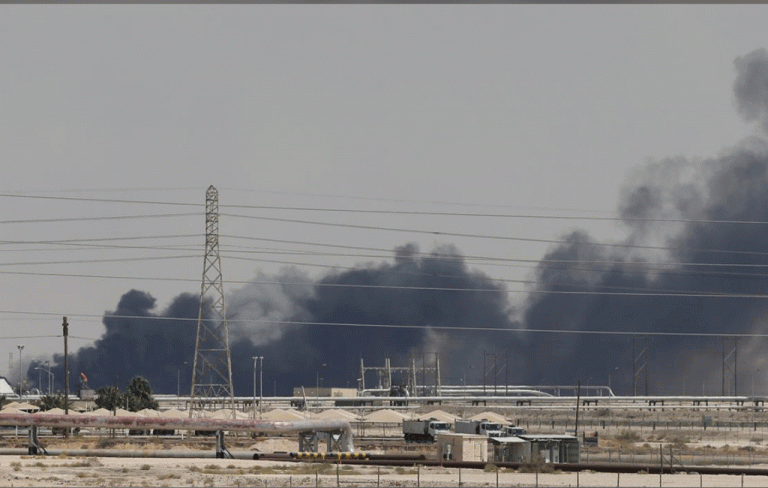
Yemen’s Iran-aligned Houthi group said it attacked two plants at the heart of Saudi Arabia’s oil industry on Saturday, knocking out more than half the Kingdom’s output, in a move expected to send oil prices soaring and increase tensions in the Middle East.
The attacks will cut the kingdom’s output by 5.7 million barrels per day (bpd), according to a statement from state-run oil company Saudi Aramco, or more than 5% of global oil supply.
The pre-dawn strikes follow earlier cross-border attacks on Saudi oil installations and on oil tankers in Gulf waters, but these were the most brazen yet, temporarily crippling much of the nation’s production capacity. Saudi Arabia is the world’s biggest exporter, shipping more than 7 million barrels of oil to global destinations every day, and for years has served as the supplier of last resort to markets.
While the Houthis claimed responsibility for the attack, U.S. Secretary of State Mike Pompeo put the blame squarely on Iran, writing on Twitter that there was “no evidence the attacks came from Yemen.”
“Amid all the calls for de-escalation, Iran has now launched an unprecedented attack on the world’s energy supply,” Pompeo said.
Saudi de facto ruler Crown Prince Mohammed bin Salman told U.S. President Donald Trump by telephone that Riyadh had the will and capability “to confront and deal with this terrorist aggression,” according to Saudi state news agency SPA.
The United States condemned the attacks and Trump told the crown prince that Washington was ready to work with the kingdom to guarantee its security, according to the White House. The U.S. Department of Energy also said it was ready to release oil from its strategic petroleum reserve if necessary. Energy Secretary Rick Perry also said his department would work with the International Energy Agency, which coordinates energy policies of industrialized nations, if global action is needed.
Saudi Arabia, leading a Sunni Muslim coalition that intervened in Yemen in 2015 against the Houthis, has blamed regional rival Shi’ite Iran for previous attacks, which Tehran denies. Riyadh accuses Iran of arming the Houthis, a charge denied by the group and Tehran.
Coalition spokesman Colonel Turki al-Malki said an investigation had been launched into who planned and executed the strikes. He said the Western-backed alliance would counter threats to global energy security and economic stability.
Aramco Chief Executive Amin Nasser said there were no casualties from the attacks.
Saudi Energy Minister Prince Abdulaziz bin Salman said Aramco would have more information within 48 hours, and it will draw down oil in storage to compensate for the loss. Aramco is in the process of planning what is expected to be the world’s largest initial public offering.





